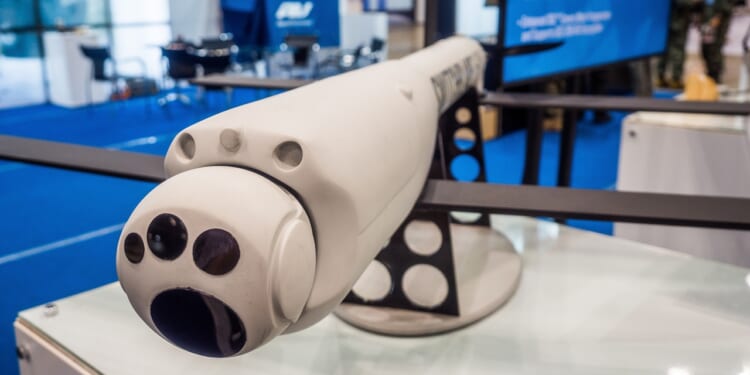The ALPAGU drone is the latest entry in Turkey’s advanced drone manufacturing sector—representing Ankara’s main foray into the “loitering munition,” or kamikaze drone.
Ankara’s drone industry continues to build, as Turkish officials are hoping to make the Western Asian nation a major defense exporter in the region. Earlier this month, Turkey’s latest indigenously designed ALPAGU unmanned aerial vehicle (UAV) system was delivered by its Savunma Teknolojeleri Muhendislik (STM) manufacturer. The fixed-wing autonomous attack drone is expected to play a leading role in Ankara’s UAV arsenal when officially introduced to the Turkish Armed Forces down the line.
“Following our surveillance, loitering, and ammunition-drop UAVs, we are now continuing deliveries with our fixed-wing loitering munition system ALPAGU,” STM general manager Ozgur Guleryuz said. “We believe that ALPAGU will further enhance our operational effectiveness in the field.”
ALPAGU is a fixed-wing loitering munition which offers Turkey and its future foreign client state operators a low-cost lethal drone option in battle. With a top cruise speed of 28 meters per second and an operating altitude of 120 meters above ground level, the ALPAGU is expected to supplement Ankara’s already diverse fleet of domestically produced drones when it comes to ease and frequency in operations. The new UAV series can identify and take out targets independently, guided by a flight control system engineered by STM manufacturers. Since the ALPAGU series can be operated by one soldier and fields highly accurate results, Ankara will likely lean on this new platform to carry out future mission sets.
Turkish Drones Have Shined During the Ukraine War
While the ALPAGU is expected to play a leading role in Ankara’s defense industry, the nation’s domestic drone capabilities have been popularized by the ongoing Ukraine War.
The Baykar Bayraktar TB2 lethal UAV, which has been deployed by Kyiv since the onset of the conflict back in February 2022, is perhaps Turkey’s most recognized homegrown drone series. Ukraine first acquired these formidable suicide drones back in 2019 and has been able to deploy its fleet to support its defensive efforts against Russian advances.
Upon the TB2’s introduction to service in the Turkish military back in 2014, the platform quickly gained prominence for its role in counterinsurgency operations Ankara launched against the People’s Defense Units and Kurdish Workers’ Party militants in northern Iraq and Syria. The medium-altitude, long-endurance UAV can be remotely controlled or deployed in autonomous flight operations. Capable of engaging adversarial targets with precision-guided munitions and providing real-time intelligence via video feeds for its operators, the lethal drone has proven to provide the versatility and flexibility required by military units on the ground. The TB2 can reach a top speed of 220km when launched and is powered by an internal combustion engine. Notably, the TB2 is not considered a “suicide” drone like the ALPAGU for its ability to loiter over a target before striking and is equipped with an operational altitude of 25,000 feet.
The TB2 and ALPAGU UAVs will likely be supplemented by additional impressive drone platforms down the line, as Ankara’s domestic defense industry continues to grow and advance.
About the Author: Maya Carlin
Maya Carlin, National Security Writer with The National Interest, is an analyst with the Center for Security Policy and a former Anna Sobol Levy Fellow at IDC Herzliya in Israel. She has by-lines in many publications, including The National Interest, Jerusalem Post, and Times of Israel. You can follow her on Twitter: @MayaCarlin. Carlin has over 1,000 articles published over the last several years on various defense issues.
Image: Shutterstock / Flying Camera.


















